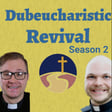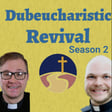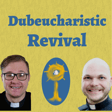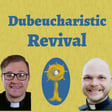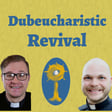
Alpha and Omega: A Wrap Up Episode
We are at the end of the beginning...the end of the Dubeucharistic Revival Podcast, and the beginning of the Age of the Eucharist...that's what we're calling it, anyway. This episode is a reflection on each of the conversations and guests that we have had, conveniently organized into three categories:
Testimonies and Conversion Stories
2: Encounter - with Matt Selby
8: Down To Earth – with Keith Nester
9: Full Circle - with Deacon Dan Rouse
6: Passionately Catholic - with Anthony Digmann
Catechesis and Teaching Themes
4: Liturgy - with Anastasia Nicklaus and Connor Miller
10: Motherhood - with Cassie Schetgen and Hannah Misak
14: Converts to the Real - with Dr. Travis Lacey
17: Eucharist in Film - with Bishop Elect Scott Bullock
19: The Quest of the Holy Grail - with Fr Kevin Earleywine
18: Preach! - with Mary Petersen
Events and Travels
3: Ground Up - with Melanie Vobr
5: BE HEALED – with Father Andy Upah and Father Michael McAndrew
7: Banquet of Justice – with Dave Pitt and Isabelle Werner
12: Rich Food, Small Bites with Sarah Burke and Liz Koenigsfeld
11: Pilgrims - with Fr. Tony Kruse
13: Fed By Christ - with Father Dennis Miller and Deacon Dan Hoeger
16: Champions - with Fr. Jake Dunne
15: The Riches of Poverty with Sister Alicia Torres
20: Eucharistic Congress Coverage - with Father Martin Coolidge and Deacon Dan Hurt
